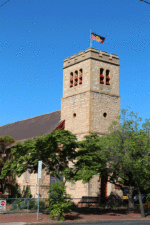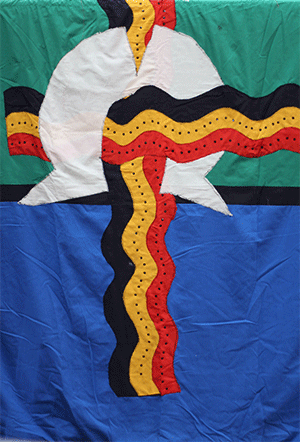ABM Archive Website
THIS WEBSITE CONTAINS ARCHIVE MATERIALS FOR HISTORICAL REFERENCE ONLY
For up-to-date information, including our latest appeals, news, and resources, please visit our current website.
NATSIAC members reflect on the change to Australia’s National Anthem
February 11, 2021

When Australia’s Prime Minister announced a change to the wording of the country’s national anthem ABM contacted NATSIAC (the National Aboriginal and Torres Strait Islander Anglican Council) to ask what Aboriginal and Torres Strait Islander Anglicans thought of the change. Although NATSIAC hasn’t had the opportunity to come to a common mind on the matter, we are grateful to the members who agreed to share their own reflections with the wider church.
Personal response to the National Anthem by Reverend Di Langham
When I was a child and went to school, every morning we would have to stand near the flag pole and we recited “I honour my God, I serve the queen, I salute the flag. The flag was raised to the then anthem, God save the Queen. I was taught we were part of the Commonwealth and I don’t really remember us having our own anthem until the 70s.
When Advance Australia Fair was gazetted as Australia’s anthem I was surprised and disappointed. I see things in pictures and the “new anthem” reminded me of a huge blanket covering our land and our story. It was a long meme that denied our history and hid it under a huge grey blanket like the physical blankets we were rationed. This time it was a covert blanket that denied the real history and transparency of the past. The more people sang it, just like all memes, it had its own energy, that allowed people to appear to move forward but in reality, they were covering a messy wound that will never heal. The wounds and scars will never heal until they are aired. The anthem blanket is another tool that stifles our voices.
The timing of the one word change by the prime minister, I believe, was a token change to appease the public before Australia Day celebrations. The word “one” has its own baggage. Since when has Australia been “one”?
When I was teaching in the mid seventies, I taught Kindergarten. Every afternoon the class would sit in a circle and sing favourite songs. One afternoon I asked the children what song they wanted to sing. A little Koori girl put her hand up and asked for the Ostrich song. I told her I couldn’t remember an ostrich song and maybe she could start it off and we would join in. She did. This is what she sang,
“Austrayas all are ostriches ……..” Next time you listen to little ones singing the anthem listen to the words. Out of the mouths of babes.
We need to fold the anthem blanket up and allow transparency in our history that allows all of us to be one. The Voice document needs to be listened to, accepted and allowed to come out from under the blanket!
The Reverend Di Langham is an Anglican Priest and Chaplain at Cessnock Correctional Centre in the Diocese of Newcastle. You can listen to more of her reflections here.
Personal response to the National Anthem by Reverend Dr Garry Deverell
‘Boundless plains to share’: Why the National Anthem supports and encourages Australia’s original sin
Australians all let us rejoice,
For we are young and free;
We’ve golden soil and wealth for toil;
Our home is girt by sea;
Our land abounds in nature’s gifts
Of beauty rich and rare;
In history’s page, let every stage
Advance Australia Fair.
In joyful strains then let us sing,
Advance Australia Fair.
Beneath our radiant Southern Cross
We’ll toil with hearts and hands;
To make this Commonwealth of ours
Renowned of all the lands;
For those who’ve come across the seas
We’ve boundless plains to share;
With courage let us all combine
To Advance Australia Fair.
In joyful strains then let us sing,
Advance Australia Fair.
These are the lyrics for the national anthem of Australia as officially adopted by the Parliament of Australia in April 1984. It is a song that I have never personally sung. On those occasions when, as part of a school or civic assembly, I was invited to sing the anthem, I declined. I still decline. Why? Because, as a trawloolway man whose family has lived in northern lutrawita/Tasmania for at least 35 thousand years, I will not sing the victory songs of the invader.
For make no mistake, this is a victory song. It is anthem that entrenches and encourages the myth of terra nulius, that most destructive of colonial fictions. This fantasia about an empty land that has been legitimately occupied by free and hard-working pioneers who deserve the spoils of their adventuring on the other side of the globe hides and obfuscates the truth of this nation’s history. That the continent was stolen from the most ancient civilisations on earth by largely absentee landlords from Britain; that the stealing was done through the agency of paid servants from the working and criminal classes who waged bloody war against the Aboriginal and Torres Strait Islander nations who were already here; that the survivors of these wars were removed from our lands and placed in camps where the speaking of our languages and the practice of our religions and cultures were outlawed; that we were forced into indentured servitude and slavery both in these camps, and on the newly stolen lands of white settlers; that, despite some gains, most of us still do not have access to our own lands, sacred stories or elders; that we remain amongst the most impoverished, unwell and incarcerated people on the planet.
For all that, we are still here, and we continue our fight to regain some of what has been lost or stolen. We cannot rejoice in the ethically questionable achievements of the colonising project called “Australia” and we cannot rejoice in the immoral annexation of our lands and waterways. For, in Australia, it seems, it is ONLY “those who’ve come across the seas” that may share in the bounty that this continent has to offer without contest or question.
For Aboriginal and Torres Strait Islander peoples, a small change in the wording of one line in this anthem will make not an iota of difference to the overall character and message of the song: this is a white country, and everyone else (especially the original inhabitants) must be content with the crumbs that fall from their master’s table. We aren’t ‘one’ people and that will never be so until the colonial web of injustice in unwoven.
In August 1996, the singing trio Tiddas made a poignant critique of the anthem in song that remains true:
This land may be beautiful
But it cannot be called fair
So don’t sing me your anthem
‘Til we’ve learned how to share
‘We are ‘the lucky country’
Where anyone can win’ –
If you were born to the right family
And have the white-coloured skin
So don’t sing me an anthem
Cause the words can’t be felt
What’s pride in a country
Without pride in yourself?
I long for the day when “closing the gap” will mean, alongside the usual indicators of improvements in health and wellbeing, a recognition of our ongoing sovereignty in this country. Until then, this anthem (along with Australia Day, the flag, and all the other apparatus of the colonial state) will remain, for Indigenous people, yet another symbol of white supremacy.
The Reverend Dr Garry Deverell is an Anglican Priest in the Diocese of Melbourne and the inaugural Vice-Chancellor’s Fellow in Indigenous Theologies at the University of Divinity. You can read more of his writing here.
Personal response to the National Anthem change by Reverend Neville Naden
Thanks for the invite to comment on the recent changes to the National Anthem.
We live in the best country in the world. And yes, the National Anthem captures that truth in detail. There is golden soil and wealth for toil; and lands abounding in natures gifts of beauty rich and rare. And yes, the First Nations People of this country want to see this country advance and move forward for all to enjoy, but not without them.
First Nations people of this country have lived here for many thousands of years. How many? Well we don’t really know, but it is far more than the National Anthem would have us believe. Yet, the First Nations people, due to the inequality that has been placed on them, during and since colonisation, are still struggling to have access to things that are espoused in the National Anthem. When First Nations people as a whole can experience the blessings of the wealth and the riches of this country, then and only then will such a Anthem ring true.
It is quite concerning that the patriotism of those who have migrated to these shores struggle to understand why the National Anthem needs to change. The purpose of the change is for it to be inclusive. Many Indigenous, First Nations people do not feel that the current National Anthem represents and includes them and their struggle. So to change it, it would seem, should be a no brainer.
If not change, then have an anthem written that reflects the true width and breadth of what it means to be an Australian. Something that takes in the history of this country that includes pre colonisation history. An Anthem that is written by someone who lives in the 21st Century. An Anthem that majors on the present and the future for all peoples.
My thoughts for what they are worth.
The Reverend Neville Naden is Indigenous Ministry Officer with the Bush Church Aid Society.
You can find more resources, including prayers for reconciliation at www.abmission.org/reconciliation



